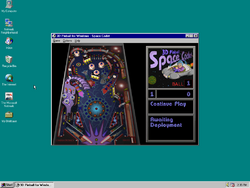Build list legend
Non-existent page
Full Tilt! Pinball (codenamed Maelstrom), is a pinball simulation game developed by Cinematronics and published by Maxis for Windows 3.1x, 95, and Mac OS 7. The game was released on 31 October 1995 and featured three CGI pinball tables: Space Cadet (space-themed), Skullduggery (pirate-themed), and Dragon's Keep (medieval-themed).
| Component of Microsoft Windows | |
 Pinball on Microsoft Plus! 95 build 310 | |
| Introduced in | Microsoft Plus! 95 |
|---|---|
| Last included in | Windows Vista build 5048 |
A direct port of the Space Cadet pinball table was included in the initial Microsoft Plus! add-on for Windows 95 as 3D Pinball for Windows. The version of the table included in Plus! was later ported to Windows NT, and was removed in Windows Vista due to a floating-point bug in the port's collision detection,[1][2] later clarified to be an issue sourced from the 64-bit DEC Alpha port of the built-in C runtime included as part of Windows NT[3] and remained unpatched during development of the initial Windows XP Itanium port, resulting in it being omitted from builds' installation media entirely, two factors that largely motivated its removal from mainline Windows releases. The version of Pinball included as part of Windows XP build 2210 crashes on launch, and is likely an exacerbation of the aforementioned issue.
The Microsoft release has several key differences from the original game:
Full Tilt! Pinball was originally written in x86 assembly,[4] and was later rewritten in the C programming language and ported to different architectures by then-current Microsoft engineer David Plummer, who was responsible for the development of the cut-down port.[5]
The game in both its 32- and 64-bit forms remained playable on later versions of Windows, and was last included in Windows Vista build 5048.
Build list legend